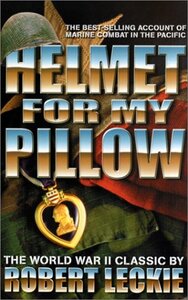Take a photo of a barcode or cover
swid's review against another edition
adventurous
sad
fast-paced
5.0
Of all of the WWII memoirs I've read this one was my least favorite. Not because it is bad or poorly written. Quite the opposite. I'm a simpleton and Leckie uses lots of big words!
Still thankful for people like Leckie who went off to war to save democracy.
Still thankful for people like Leckie who went off to war to save democracy.
desertjarhead505's review against another edition
4.0
A solid memoir. Leckie describes his experience from the time he decided to enlist in the Marine Corps just after Pearl Harbor to the end of the war. During that time he fought in the battles of Guadalcanal, Cape Gloucester, and Peleliu, in the last of which he was badly enough wounded that he spent the rest of the war in a hospital.
Writing in a flamboyant style, Leckie is unsparing of himself and others in his account; he fought well, but he was a disciplinary problem and had real trouble dealing with authority. Having seen both sides as a former junior Marine and a former officer, my take is that he did have run-ins with some bad leaders, but he generalized that too much - no other account I've read carries near the bitterness toward officers and senior NCOs in general, and based on those accounts and my experiences I can't believe he didn't have a lot more good leaders than he acknowledges.
The problems of military caste and privilege and abuse of rank he portrays exist, but not to the extent he portrays. If they did, Marines and soldiers wouldn't follow their leaders into life-and-death situations or mourn them the way, for example, Eugene Sledge and R.V. Burgin relate in their own memoirs of service as Marines in the same war and sometimes the same battles.
So as a leader, I kept finding myself annoyed at Leckie's attitude, but that didn't make me want to stop reading. If he'd been in my unit, I suspect I'd have been writing him up both for medals and on disciplinary charges at different times.
Writing in a flamboyant style, Leckie is unsparing of himself and others in his account; he fought well, but he was a disciplinary problem and had real trouble dealing with authority. Having seen both sides as a former junior Marine and a former officer, my take is that he did have run-ins with some bad leaders, but he generalized that too much - no other account I've read carries near the bitterness toward officers and senior NCOs in general, and based on those accounts and my experiences I can't believe he didn't have a lot more good leaders than he acknowledges.
The problems of military caste and privilege and abuse of rank he portrays exist, but not to the extent he portrays. If they did, Marines and soldiers wouldn't follow their leaders into life-and-death situations or mourn them the way, for example, Eugene Sledge and R.V. Burgin relate in their own memoirs of service as Marines in the same war and sometimes the same battles.
So as a leader, I kept finding myself annoyed at Leckie's attitude, but that didn't make me want to stop reading. If he'd been in my unit, I suspect I'd have been writing him up both for medals and on disciplinary charges at different times.
simonbb's review against another edition
adventurous
challenging
dark
emotional
informative
inspiring
reflective
sad
tense
4.25
piotrjawor's review against another edition
5.0
A masterpiece of a kind. No need to dispute.
Strikingly honest and wise; perfectly written. No surprise that became a part of the story-foundation of my favourite TV-series.
Strikingly honest and wise; perfectly written. No surprise that became a part of the story-foundation of my favourite TV-series.
cascadeshiker's review against another edition
5.0
Really excellent. 50 years old, but as fresh as today.
doomchipmunk's review against another edition
challenging
dark
emotional
hopeful
reflective
sad
tense
fast-paced
4.0
elizabeth_jane24's review against another edition
5.0
And now to that Victim whose Sign rose above the world two thousand years ago, to be menaced now by that other sign now rising, I say a prayer of contrition. I, whom you have seen as irreverent and irreligious, now pray in the name of Chuckler and Hoosier and Runner, in the name of Smoothface, Gentlemen, Amish, and Oakstump, Ivy-League and Big-Picture, in the name of all those who suffered in the jungles and on the beaches, from Anzio to Normandy--and in the name of the immolated: of Texan, Rutherford, Chicken, Loudmouth, of the Artist and White-Man, Souvenirs and Racehorse, Dreadnought and Commando--of all these and the others, dear Father, forgive us for that awful cloud.
ardwulf's review against another edition
4.0
Leckie's firsthand account of his experiences in the Second World War reveal as much about the mind of the warrior outside of combat as within it. Very much worth reading for anyone interested in the Pacific Theatre or some of the greatest battles ever fought by the United States Marines.
wangxian24's review against another edition
5.0
I really enjoyed Leckie's account of his war experience. He served in the Pacific Theater, and spent most of his time in the Solomon Islands and New Britain. On a personal level, the particular islands he mentions are the same ones and the same time frame that my grandfather was stationed on. Even though my grandfather was in the Navy and Leckie the First Marines, just hearing about what it was like in these islands makes the picture of my grandfather's time on these islands a bit more clear. So this book was really good, and it has a personal connection to me. I recommend it to anyone who likes to read memoirs or military history. Most of Leckie's story takes place outside of the battles, but I found it just as interesting. Read Eugene Sledge for the battles.
